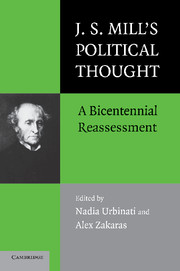Book contents
- Frontmatter
- Contents
- List of Contributors
- Introduction
- PART ONE LIBERTY AND ITS LIMITS
- 1 Mill on Liberty and on the Contagious Diseases Acts
- 2 Rational Freedom in John Stuart Mill's Feminism
- 3 The Many Heads of the Hydra: J. S. Mill on Despotism
- 4 J. S. Mill and Liberal Socialism
- 5 The Method of Reform: J. S. Mill's Encounter with Bentham and Coleridge
- PART TWO DEMOCRACY AND THE INDIVIDUAL
- PART THREE BEYOND NATIONAL BORDERS
- Bibliography
- Index
1 - Mill on Liberty and on the Contagious Diseases Acts
Published online by Cambridge University Press: 08 January 2010
- Frontmatter
- Contents
- List of Contributors
- Introduction
- PART ONE LIBERTY AND ITS LIMITS
- 1 Mill on Liberty and on the Contagious Diseases Acts
- 2 Rational Freedom in John Stuart Mill's Feminism
- 3 The Many Heads of the Hydra: J. S. Mill on Despotism
- 4 J. S. Mill and Liberal Socialism
- 5 The Method of Reform: J. S. Mill's Encounter with Bentham and Coleridge
- PART TWO DEMOCRACY AND THE INDIVIDUAL
- PART THREE BEYOND NATIONAL BORDERS
- Bibliography
- Index
Summary
The Contagious Diseases Acts
The health of the roughly 270,000 members of the British armed forces – the Royal Army and the Royal Navy – was a matter of great concern in the middle of the nineteenth century. Most of us know this from accounts of the work of reformers like Florence Nightingale, during and after the Crimean War, in setting up a properly administered system of field hospitals and agitating for general reforms in hygiene and sanitation. A more troubling set of issues concerned the impact of sexually transmitted diseases on health, readiness, and morale. Prostitution was rife on army bases and in garrison towns and ports in these areas; many contemporary and modern accounts accompany this point with the observation that the army did not permit most enlisted men to marry and sometimes also with a reminder that homosexual sodomy was unlawful – from which we are supposed to conclude that the only sexual outlet available to these men was fraught with the risk of disease. Whatever the reason, it is said that approximately one-third of the members of armed forces contracted venereal disease. And this – as the administrators and politicians responsible for modernizing the army and navy came to see – was intolerable.
In the 1860s, three statutes were passed by Parliament, known as the Contagious Diseases Acts. They all involved various measures to supervise the health of prostitutes, and they were all focused specifically on port and garrison cities.
- Type
- Chapter
- Information
- J.S. Mill's Political ThoughtA Bicentennial Reassessment, pp. 11 - 42Publisher: Cambridge University PressPrint publication year: 2007
- 8
- Cited by



